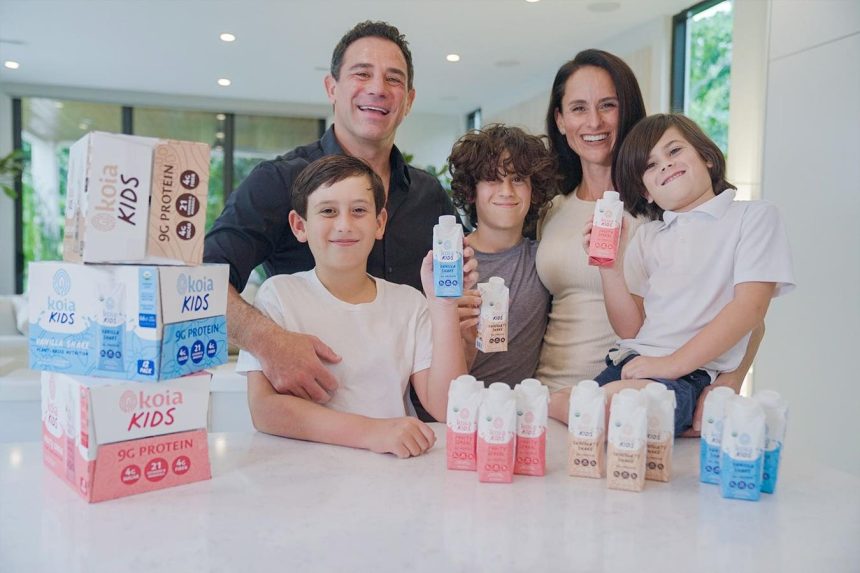Chris Hunter’s entrepreneurial journey has been a fascinating evolution, marked by both controversy and redemption. From co-founding the infamous alcoholic beverage Four Loko to helming Koia, a leading plant-based protein drink company, Hunter’s path underscores the power of personal alignment and adaptability in the business world. His story began with Four Loko, a caffeine-and-alcohol concoction born from the youthful exuberance of Hunter and his partners. While the brand achieved phenomenal success, Hunter’s personal evolution towards health and wellness, particularly after starting a family, led him to seek a more meaningful venture. This shift in values prompted him to invest in and eventually lead Koia, a company dedicated to providing better-for-you products. Hunter’s experience demonstrates how personal growth can influence entrepreneurial direction, leading to ventures that resonate deeply with one’s own values.
Hunter’s memoir, “Blackout Punch: An Entrepreneur’s Journey from Chaos to Clarity,” provides a raw and honest account of his experiences with Four Loko, offering valuable insights into the complexities of building a controversial brand. The book emerged from a desire to share his story authentically, motivated by the realization that his experiences could offer valuable lessons to others. The decision to write the memoir was also driven by a commitment to transparency with his children, demonstrating that entrepreneurial journeys are not always linear and often involve both triumphs and missteps. The book’s core message emphasizes the importance of learning from mistakes and evolving as an individual and a business leader.
The transition from Four Loko to Koia was catalyzed by a significant personal event: the birth of Hunter’s second son and the subsequent discovery of his family’s various food sensitivities, including his own to dairy, gluten, caffeine, and alcohol. This revelation, coupled with the limited availability of palatable dairy-free options at the time, sparked the idea for a better alternative. Recognizing the potential of a small, nascent plant-based beverage brand called Raw Nature 5, Hunter invested in the company, eventually rebranding and launching it as Koia. This pivotal moment exemplifies how personal needs can identify market gaps and inspire innovative solutions, transforming a personal challenge into a promising business venture.
Koia’s growth was further fueled by strategic partnerships with celebrities and athletes who invested in the brand, not merely as endorsers but as stakeholders. Hunter learned from his past experiences with celebrity endorsements that authenticity and genuine alignment are crucial for successful partnerships. He prioritized collaborations with individuals who genuinely believed in Koia’s mission and products, leveraging their insights and networks to enhance the brand’s reach and impact. This approach highlights the evolving landscape of influencer marketing, where genuine connection trumps superficial endorsements. These partnerships extended beyond traditional marketing efforts, providing valuable feedback and insights that shaped Koia’s product development.
Innovation remained a cornerstone of Koia’s strategy, driven by consumer feedback and Hunter’s own family experiences. Observing his children’s consumption habits led to the development of Koia Kids, a protein drink specifically formulated for children with lower sugar content and allergen-free ingredients. This product addressed a gap in the market for healthy, kid-friendly protein options, demonstrating how attentive observation and a customer-centric approach can drive successful product diversification. The meticulous attention to detail, including the use of specific vitamin forms and avocado oil, further underscores Koia’s commitment to providing genuinely nutritious products for children.
Addressing consumer demand for bulk purchasing and convenient delivery, Koia embarked on a significant shift from solely refrigerated products to include a shelf-stable line. This transition required overcoming consumer perceptions surrounding shelf-stable products and ensuring the integrity of the ingredients despite the change in processing. This move was facilitated by Koia’s decision to vertically integrate its manufacturing process, acquiring its own production facility. While initially hesitant about the complexities of in-house manufacturing, the challenges posed by the COVID-19 pandemic highlighted the importance of supply chain control. This strategic decision, though challenging, ultimately proved beneficial, enabling greater quality control, improved profitability, and enhanced flexibility for future innovation.
The vertical integration of manufacturing empowered Koia to respond more effectively to consumer preferences and market trends. It allowed for the introduction of new packaging formats, such as multi-serve bottles and multi-packs, as well as seasonal flavors and expansion into new retail channels like Costco and Target. This agility and responsiveness further solidifies Koia’s commitment to meeting evolving consumer demands and diversifying its product offerings. The company’s focus on continuous improvement and adaptation is key to its sustained success in the competitive health and wellness market.
Hunter’s experience on both sides of the investor-entrepreneur dynamic has provided a unique perspective on building and scaling a successful business. He emphasizes the importance of velocity as a key metric for both investing and brand building. His immersion in the better-for-you space enables him to stay attuned to emerging trends and consumer preferences, informing Koia’s product development and market positioning. This holistic understanding of the industry allows him to anticipate market shifts and make informed decisions that drive the brand’s continued growth.
Reflecting on his entrepreneurial journey, Hunter offers invaluable advice to aspiring business leaders. He stresses the importance of thorough research, balanced with the understanding that analysis paralysis can be detrimental. He encourages entrepreneurs to enter the market and learn through testing and iteration, acknowledging that the path to success is rarely linear and often requires adaptation. Importantly, he cautions against underestimating the challenges inherent in building a brand, emphasizing the need for deep passion and resilience to navigate the inevitable ups and downs. His final piece of advice reinforces the idea that entrepreneurial endeavors, despite their inherent difficulties, are ultimately rewarding for those with the dedication and perseverance to see them through. Hunter’s story serves as a compelling example of how learning from past experiences, embracing change, and prioritizing personal alignment can lead to enduring success in the ever-evolving world of business.



